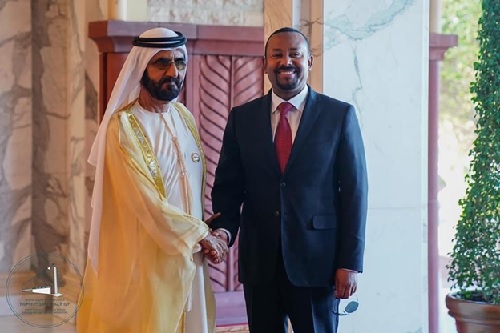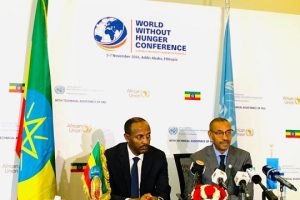
BY SOLOMON WASSIHUN
Due to its geographical proximity and contrast, Ethiopia’s relations with the Arabian Peninsula run deep and diverse with all sorts of interactions, including culture, religion, and trade. The Ethio-Arab people relations have continued unabated for centuries, regardless of the checkered history of the trans-Red Sea politics. People from both sides of the Red Sea have been migrating in good and bad times and formed a strong social bond of coexistence that stood the taste of time. The contrasting and yet complementary resources in Ethiopia and the Arab world provide ample opportunities for cooperation for mutual benefits.
Since the advent of the reformist government in Ethiopia, several encouraging diplomatic endeavors have been exerted to exploit the potential areas of bilateral and multilateral corporation between Ethiopia and the Arab world. As a result of Ethiopia’s revitalized foreign policy, the nation’s relations with the states of the Arab peninsula is at their best condition for several decades.
Ethiopia has forged strong diplomatic and economic ties with several Arab states, including those that do not see each other eye to eye on several geopolitical issues. The government has managed to cultivate productive and thriving diplomatic and economic relations with the major players of the Arab Peninsula, including Saudis and the Emiratis, the two crucial Gulf actors. Two high-level government delegations have been paying visits to the Saudis and the Emiratis simultaneously over the last few days. The Ethiopian delegation led by the Finance Minister met the Saudis, while the other led by the Premier himself engaged with the Emiratis.
Ethiopia’s relation with the United Arab Emirates, UAE in particular, has witnessed remarkable improvements, since the regime change in Ethiopia in 2018, to assume a broad spectrum of bilateral cooperation based on mutual benefits. The 49 years of bilateral relations between the two countries have grown by leaps and bounces over the last four years.
The strong Ethio-Emirates relations, who emphasize common interests, mutual benefits, and non-interference in internal affairs, could serve as a model for forging similar partnerships with other gulf countries. This is so because UAE is one of the foremost influential Gulf States. The UAE, a global trade hub and the GCC’s second-biggest economy, is forecasted to grow 4.8% this year, the fastest since 2015. It is one of the leading Gulf countries that sought to reassert their interests in the strategic Red Sea region, embarking on a flurry of political engagements and economic investments with countries of the Horn.
The New York Times magazine has once described MBZ, Mohammed bin Zayed al-Nahyan, the de facto ruler of the United Arab Emirates, as one of the most powerful men on Earth. The Middle East ambitions of Western powers increasingly pass through the UAE. An avalanche of heads of states and governments has been descending on the land of Emirates recently to meet MBZ. The Ethiopian Premier, the Egyptian President, and the Israeli President have visited UAE within a gap few days.
The timing of these state visits is less likely to be coincidental, especially those of the Ethiopian Premier and the Egyptian president. As one analyst put it, the UAE is revisiting its foreign policy goals to boost its global trade partnerships,ensure its security and stability, and maximize its role as a regional power by replacing robust military intervention and proxy politics with dialogue and diplomacy.
One of the major factors that put Ethiopia and the UAE on the same page is their shared sheer determination to fight terrorism. Both nations have implemented a strict policy against domestic and international terrorism for decades, and are pursuing coordinated, integrated, and innovative initiatives. Ethiopians are grappling with the crisis caused by domestic terrorists like TPLF and Shene, and are fighting Al Shabaab in neighboring Somalia. Likewise, UAE has been fighting terrorism even beyond its borders, including Yemen, Libya, Syria, and Somalia. The UAE has also allocated all national potentials and expertise to coordinate with international, regional, and sub-regional mechanisms relevant to countering terrorism.
The Emirati leaders assume that the security and stability of the Arabian Peninsula and the Horn of Africa are closely linked. The Ethiopians attach great importance to the geopolitics of these two regions. Thus, the two countries share several regional political agendas to jointly exploit the opportunities and tackle the challenges in the region. The UAE has engaged with its ally nations like Ethiopia in peace, security, and development efforts. The Emiratis have played a considerable role in Premier Abiy’s internationally acclaimed peace deal, which brought the Eritrea-Ethiopia rapprochement in 2018.
Some analysts say the UAE has emerged as an important protagonist in the Horn of Africa. Its multi-sectorials relations with the Horn of Africa giant[ Ethiopia], which is going from strength to strength, would spur favorable conditions for the further growth of the presence of UAE in the Horn.
The Emiratis have proved themselves a true friend of Ethiopia on several critical occasions In 20l8, when the then corrupt and criminal TPLF-led regime fell from power with nationwide popular revolt, what the incoming government got was an empty vault, so to speak. As the Premier mentioned at the time, his government has been in a dire foreign exchange shortage and was reaching the critical point of being unable to pay civil servants’ salaries.
At that trying time when Ethiopia looked for friends to lean on, the UAE leader, MBZ touched down at Addis Ababa for an official visit, and then the news of a $3 billion aid and investment pledge from the UAE to Ethiopia followed.
A Few months ago, when the military aggression of the terrorist TPLF was at its height, and it was invading and destroying the town on multiple fronts, Ethiopia came under intense diplomatic pressures pushing it to compromise its sovereign rights. One of the few countries that practically showed their solidarity with Ethiopia’s fight for survival was the UAE.
The Ethiopian Ambassador to UAE recently said: “At a time when our country was facing serious challenges, when powerful nations were waging a concerted diplomatic campaign against Ethiopia, UAE stood alongside our country. A friend that stands beside you, when you are facing challenges is a true friend. So we say the government of the UAE is a true friend of Ethiopia. Moreover, The UAE government provides incentives to its financiers and entrepreneurs to encourage them to invest in Ethiopia.”
UAE is arguably on the list of Ethiopia’s top and most reliable strategic allies like China, Russia and Turkey. The latest official visit of the Ethiopian Premier to the Gulf nation would surely take the already strong relationship between the two nations to a new level. The Premier’s visit would create enabling condition for intensifying the exploitation of the untapped potentials of corporations between Ethiopia and the Arab world.
The Ethio-Emirates relations witnessed significant development during the recent past, in trade and investment in such areas as manufacturing, real estate, agriculture, among others. The latest meeting of the two leaders would enable them to jointly review the progress and opportunities in the cooperation between their countries in various sectors of investments, trade links, technology transfer, tourism, and infrastructure development endeavors.
The deepening diplomatic bond and economic ties between the two countries have boosted people-to-people relations. As a result of this, hundreds of thousands of Ethiopians are residing and working in UAE; and several Emirati investors are engaged in various lucrative businesses in Ethiopia.
The Ethiopian Herald February 8/2022




